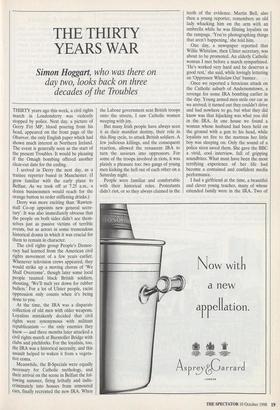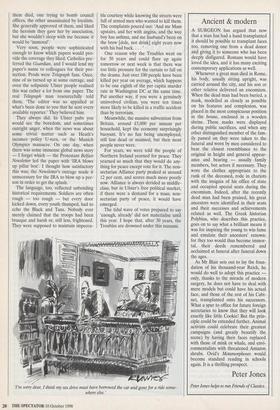THE THIRTY YEARS WAR
Simon Hoggart, who was there on day two, looks back on three decades of the Troubles THIRTY years ago this week, a civil rights march in Londonderry was violently stopped by police. Next day, a picture of Gerry Fitt MP, blood pouring from his head, appeared on the front page of the Observer, the only English paper which had shown much interest in Northern Ireland. The event is generally seen as the start of the present Troubles. It would be pleasing if the Omagh bombing offered another clear-cut date for the ending.
I arrived in Deny the next day, as a trainee reporter based in Manchester. (I grew familiar with the early plane to Belfast. As we took off at 7.25 a.m., a dozen businessmen would reach for the orange button to order stiffening drinks.) Deny was more exciting than `Rawten- stall Co-op appoints new general secre- tary'. It was also immediately obvious that the people on both sides didn't see them- selves just as passive victims of terrible events, but as actors in some tremendous historical drama in which it was crucial for them to remain in character.
The civil rights group People's Democ- racy had learned from the American civil rights movement of a few years earlier. Whenever television crews appeared, they would strike up a moving chorus of 'We Shall Overcome', though later some local people taunted black British soldiers, shouting, 'We'll melt yer down for rubber bullets.' For a lot of Ulster people, racist oppression only counts when it's being done to you.
At the time, the IRA was a disparate collection of old men with older weapons. Loyalists mistakenly decided that civil rights were synonymous with militant republicanism — the only enemies they knew — and three months later attacked a civil rights march at Burntollet Bridge with clubs and pitchforks. For the loyalists, too, the IRA was a historical necessity, and this assault helped to waken it from a vegeta- tive coma.
Meanwhile, the B-Specials were equally necessary for Catholic mythology, and their arrival on the scene in Belfast the fol- lowing summer, firing lethally and indis- criminately into houses from armoured cars, finally recreated the new IRA. When the Labour government sent British troops onto the streets, I saw Catholic women weeping with joy.
But many Irish people have always seen it as their manifest destiny, their role in this Ring cycle, to attack British soldiers. A few judicious killings, and the consequent reaction, allowed the renascent IRA to turn the saviours into oppressors. For some of the troops involved in riots, it was plainly a pleasure too: two gangs of young men kicking the hell out of each other on a Saturday night.
People were familiar and comfortable with their historical roles. Protestants didn't riot, or so they always claimed in the teeth of the evidence. Martin Bell, also then a young reporter, remembers an old lady whacking him on the arm with an umbrella while he was filming loyalists on the rampage. 'You're photographing things that aren't happening,' she told him.
One day, a newspaper reported that Willie Whitelaw, then Ulster secretary, was about to be promoted. An elderly Catholic woman I met before a march sympathised. 'He's worked very hard and he deserves a good rest,' she said, while lovingly lettering an 'Oppressor Whitelaw Out' banner.
Once we reported a ferocious attack on the Catholic suburb of Andersonstown, a revenge for some IRA bombing earlier in the day. Young armed men stole our car as we arrived; it turned out they couldn't drive and had nowhere to go, but what they did know was that hijacking was what you did in the IRA. In one house we found a woman whose husband had been held on the ground with a gun to his head, while loyalists set fire to the mattress her little boy was sleeping on. Only the sound of a police siren saved them. She gave the BBC a vivid, cool interview, full of gripping soundbites. What must have been the most terrifying experience of her life had become a contained and confident media performance.
I had a girlfriend at the time, a beautiful and clever young teacher, many of whose extended family were in the IRA. Two of them died, one trying to bomb council offices, the other assassinated by loyalists. She generally approved of them, and liked the heroism they gave her by association, but she wouldn't sleep with me because it would be 'immoral'.
Very soon, people were sophisticated enough to know which papers would pro- vide the coverage they liked. Catholics pre- ferred the Guardian, and I would lend my paper's name to colleagues for their pro- tection. Prods were Telegraph fans. Once, nine of us turned up at some outrage, and even the solipsistic Ulster people realised this was rather a lot from one paper. The real Telegraph man resourcefully told them, 'The editor was so appalled at what's been done to you that he sent every available reporter.' They believed him.
They always did. In Ulster pubs you would see the boredom, and sometimes outright anger, when the news was about some trivial matter such as Heath's incomes policy U-turn, or the Munich Olympics massacre. On one day, when there was some immense global news story — I forget which — the Protestant Belfast Newsletter led the paper with 'IRA blows up pillar box'. I thought how satisfactory this was; the Newsletter's outrage made it unnecessary for the IRA to blow up a per- son in order to get the splash.
The language, too, reflected unbending historical requirements. Soldiers are often rough — too rough — but every door kicked down, every youth thumped, had to echo the Black and Tans. Nobody ever merely claimed that the troops had been brusque and harsh or, still less, frightened. They were supposed to maintain impecca- ble courtesy while knowing the streets were full of armed men who wanted to kill them. The complaints poured out: 'And me Mam upstairs, and her with angina, and the wee boy has asthma, and me husband's been on the brew [dole, not drink] eight years now with his bad back. . . . '
One reason why the Troubles went on for 30 years and could flare up again tomorrow or next week is that there was too little pressure for the curtain to fall on the drama. Just over 100 people have been killed per year on average, which happens to be one eighth of the per capita murder rate in Washington DC at the same time. Put another way, if you were a genuinely uninvolved civilian, you were ten times more likely to be killed in a traffic accident than by terrorism.
Meanwhile, the massive subvention from Britain, around £5,000 per annum per household, kept the economy surprisingly buoyant. It's no fun being unemployed, still less dead or maimed, but then most people never were.
For years, we were told the people of Northern Ireland yearned for peace. They yearned so much that they would do any- thing for peace except vote for it. The non- sectarian Alliance party peaked at around 12 per cent, and scores much more poorly now. Alliance is always derided as middle- class, but in Ulster's free political market, if there were a demand for a mass, non- sectarian party of peace, it would have emerged.
The tidal wave of votes prepared to say 'enough, already' did not materialise until this year. I hope that, after 30 years, the Troubles are drowned under this tsunami.
'I'm sorry dear, I think my sex drive must have borrowed the car and gone for a ride some- where else.'











































































 Previous page
Previous page